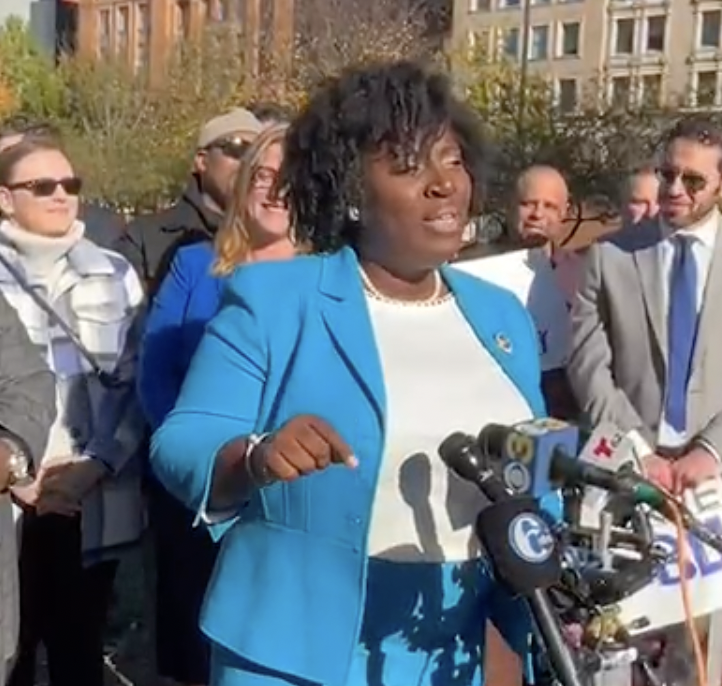McClinton Proposes Election Day Voter Registration, Two Weeks of Voting

State House Speaker Joanna McClinton unveiled legislation at a Capitol news conference Tuesday to make it easier for Pennsylvanians to vote.
McClinton’s bill would allow registered Pennsylvania voters to vote early, in person, during the two weeks before Election Day. It would also allow same-day voter registration at polling locations the day of the election.
“Voting is at the core of our national identity and among our most valued rights as Americans,” said McClinton (D-Philadelphia). “Rather than spur distrust in our system and attack our dedicated election workers, we should look for ways to make the system accessible to more Pennsylvanians so their voices can be heard.
“Measures like these add convenience and security and have already been adopted in dozens of other states, including states with historic records of voter suppression like Florida and Georgia.”
However, her bill is likely to meet opposition from Republican lawmakers.
“We cannot properly register people to vote and administer elections on the current timelines in the law,” said House Republican Leader Bryan Cutler (R-Lancaster). “This proposal does nothing to increase Pennsylvania’s election integrity and once again injects more partisanship and mixed messaging during a presidential election year.”
But Senate Majority Leader Joe Pittman (R-Indiana) suggested a compromise could be on the horizon. “A lot can happen if we get Voter ID as a constitutional amendment.”
J. Christian Adams, founder of the Election Law Center and general counsel for the Public Interest Legal Foundation, is skeptical.
“Same day registration doesn’t provide enough time to validate eligibility,” said Adams. His organization promotes ballot security and is currently suing Pennsylvania to obtain information regarding the registration of foreign nationals at PennDOT offices for more than two decades.
McClinton said same-day voter registration would allow eligible Pennsylvanians to register when it’s most relevant and convenient—on Election Day. It would also enable real-time corrections to inaccurate voter rolls, strengthening the safety and security of the election system.
It seems to be working in New Hampshire, which holds the first presidential primary in the nation every four years.
“New Hampshire has had election day registration since 1993. It has worked well in our state, and has resulted in consistently high voter participation rates,” New Hampshire Secretary of State David Scanlan told DVJournal.
McClinton says allowing two weeks of early in-person voting on machines would give Pennsylvanians with demanding work schedules or family responsibilities an opportunity to cast their vote at a time that works best for them. It would also decrease congestion at the busiest polling locations. Also, it would help seniors, especially those who use wheelchairs or walkers, allowing more time to accommodate their needs.
Pennsylvania Voice Executive Director Salewa Ogunmefun support these new voting rules.
“These commonsense reforms will not only make it more convenient for all Pennsylvanians to make their voices heard at the ballot box, they will also help make our elections more secure,” said Ogunmefun. “We couldn’t be happier that Speaker McClinton has decided to make this a priority and look forward to working with her to get them passed into law.”
“I vote. I want to vote. I believe it’s my civic duty to vote. But when life becomes challenging, so can voting,” said Angela Madera, a voter from Allentown. “There are so many people like me who have to overcome barriers simply to cast our ballot. It shouldn’t be that way. Voting is our right. Pennsylvanians are busier than ever. Work schedules and family commitments vary. Our voting system needs to accommodate these new realities and reflect the needs of today’s citizens. I’m so grateful to the speaker for standing up for voters like me.”
“In order to have elections that are fully accessible to all, the Commonwealth must implement policies that are mindful of the challenges people with disabilities encounter when trying to vote. The changes proposed are welcome expansions to voting access in Pennsylvania and individuals with disabilities will especially benefit from more flexible opportunities to vote,” said Jennifer Garman, director of government affairs for Disability Rights Pennsylvania.
McClinton’s legislation compliments voting changes implemented by the Shapiro administration in 2023, including automatic voter registration when people get their driver’s licenses or state identification cards and redesigning mail-in ballots.
Spokesperson Manuel Bonder said, “Gov. Josh Shapiro is supportive of these priorities and expanding voting opportunities for eligible Pennsylvanians as we continue working to ensure our elections are free, fair, safe, and secure. The Shapiro administration looks forward to continuing to work alongside Speaker McClinton on these priorities.”
“As the birthplace of American democracy, it’s time we offered Pennsylvanians more options to vote safely and conveniently, reduce the time people wait in line to cast a ballot and guarantee that every voter has enough time to exercise their right to participate in our elections. Every voice matters.” McClinton said.
The primary is on April 23. The last day to request a mail-in or absentee ballot is April 16.
Please follow DVJournal on social media: Twitter@DVJournal or Facebook.com/DelawareValleyJournal


